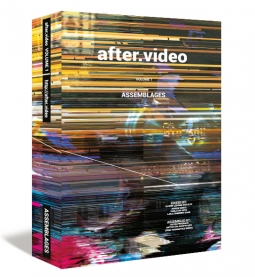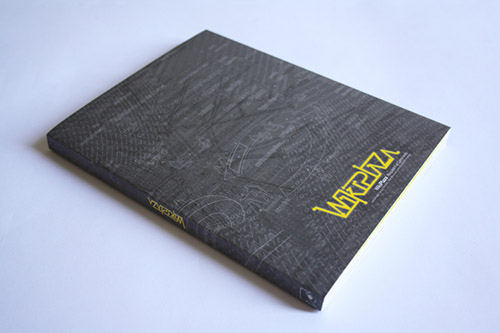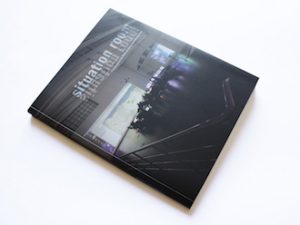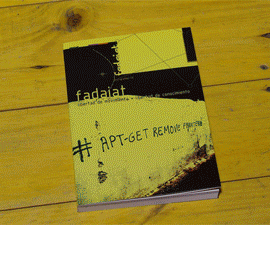After.Video Assemblages
 After.Video realizes the world through moving images and reassembles theory after video. Extending the formats of ‘theory’, it reflects a new situation in which the world and video have grown together.
After.Video realizes the world through moving images and reassembles theory after video. Extending the formats of ‘theory’, it reflects a new situation in which the world and video have grown together.
This is an edited collection of assembled and annotated video essays living in two instantiations: an online version – located on the web, and an offline version – stored on a server inside a VHS (Video Home System) case. This is both a digital and analogue object: manifested, in a scholarly gesture, as a ‘video book’.
We hope that different tribes — from DIY hacker camps and media labs, to unsatisfied academic visionaries, avantgarde-mesh-videographers and independent media collectives, even iTV and home-cinema addicted sofa surfers — will cherish this contribution to an ever more fragmented, ever more colourful spectrum of video-culture, consumption and appropriation…
Title: After.Video Assemblages
Editors: Oiver Lerone, Adnan Hadzi, Pablo DeSoto & Laila Shereen Sakr.
ISBN: 978-1-906496-23-4
Date: December 2016
Publisher: Open Humanities Press, ‘Liquid Books’ series
WikiPlaza: Request for comments
 WikiPlaza presents the practical and theoretical research carried out by hackitectura.net and a broad network of collaborators from 2005 to 2010, in the field of the participatory social construction of public space mediated by information and communication technologies. The work aims to condense the experiences of free software and hacker culture, and the social and independent media movements that emerged at the turn of the twenty-first century, in order to produce âecosophic machinesâ that is, new technical, social and mental ecologies that offer an alternative to the dominant neoliberalism and promote and stimulate emancipation, autonomy and spaces of the commons.
WikiPlaza presents the practical and theoretical research carried out by hackitectura.net and a broad network of collaborators from 2005 to 2010, in the field of the participatory social construction of public space mediated by information and communication technologies. The work aims to condense the experiences of free software and hacker culture, and the social and independent media movements that emerged at the turn of the twenty-first century, in order to produce âecosophic machinesâ that is, new technical, social and mental ecologies that offer an alternative to the dominant neoliberalism and promote and stimulate emancipation, autonomy and spaces of the commons.
The subtitle Request For Comments is our small homage to the pioneers of the Internet and points to the fact that the wikiplaza project is a work in progress, open to anybody who wants to question, use or change it, or to create new versions. We hope that the term âWikiPlazaâ will go from being a proper noun to a common noun, that can be used to refer to any connected, equipped space-laboratory that is citizen-managed, open, horizontal and experimental. And to top it all off, during this research process weâve managed to have fun. We hope that readers also enjoy the ride, and adopt the ideas and tools that we publish here in all sorts of ways!
Title: WikiPlaza
Editors: Sergio Moreno, José Pérez de Lama, Laura Andrade
Editor (Collaborator): Pablo DeSoto
ISBN: 978-84-615-0764-1
Date: 2011
Publisher: dpr-barcelona
Situation Room: Designing a prototype of a Citizen Situation Room
 The term Situation Room is normally used to designate a secret place used in times of crisis to assess and monitor data for decision-making purposes. Its origins can be traced back to World War II with the invention of computers, digitalization, and the collaboration of architects and the military. These rooms are equipped with monitors and data boards used to control everything from flows crossing the strait of Gibraltar to nuclear fission processes in Nuclear Power plants and the life support mechanisms onboard the International Space Station.
The term Situation Room is normally used to designate a secret place used in times of crisis to assess and monitor data for decision-making purposes. Its origins can be traced back to World War II with the invention of computers, digitalization, and the collaboration of architects and the military. These rooms are equipped with monitors and data boards used to control everything from flows crossing the strait of Gibraltar to nuclear fission processes in Nuclear Power plants and the life support mechanisms onboard the International Space Station.
«Rather than being afraid of control, and technologies in general, we prefer to think in terms of social appropriation and implementation with research and creativity; we even think that, as Cybersyn shows, the source of technological creativity actually lies in social cooperation, and that it is only later captured by the military or capitalism.»- Hackitectura.
Title: Situation Room
Editor: Pablo DeSoto & Hackitectura
ISBN: 978-84-614-1504-5
Date: May 2010
Publisher: dpr-barcelona
Fadaiat: Freedom of movement, freedom of knowledge
 The Straits of Gibraltar is a mirror-territory of the transformations taking place in the world today: globalisation, migrations, borders, citizenship, network-society, communication, technologies… the border is a crossed-place, an extensive territory of life and mobile confinements where multiple social practices put pressure on established limits. new spaces and relationships emerge from and through the border between southern Europe and northern Africa.
The Straits of Gibraltar is a mirror-territory of the transformations taking place in the world today: globalisation, migrations, borders, citizenship, network-society, communication, technologies… the border is a crossed-place, an extensive territory of life and mobile confinements where multiple social practices put pressure on established limits. new spaces and relationships emerge from and through the border between southern Europe and northern Africa.
The book and all it entails plays an important and irreplaceable role, but it is just a fragment of a process that goes far beyond it in terms of both time and subject matter. Here it opens new possible becomings that were mere conjectures until it was written; it is a line with relative autonomy running parallel to the other relatively autonomous part-projects and establishing fruitful exchanges among them, which in turn become an opportunity for new projects.
Through this process, and especially the publishing of this book, we want to contribute to the existence of new spaces of social and technological hybridisations that, by forging new paths, continually (re)invent world(s).
Title: Fadaiat: Freedom of movement, freedom of knowledge
Editor: Pablo DeSoto & Pilar Monsell
ISBN: 84-690-08854
Date: September 2006
Publisher: cedma
Download here.
